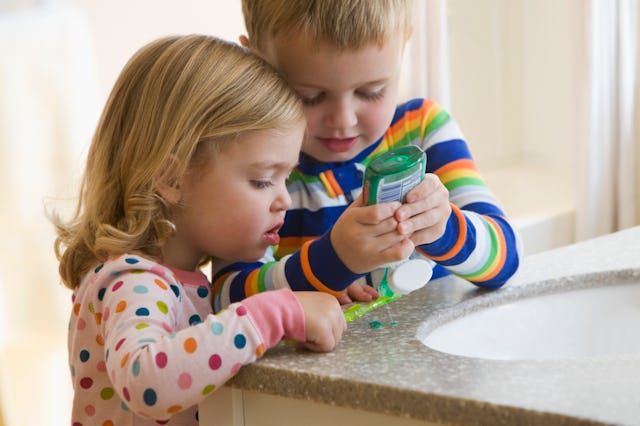Yes, Kids Should Absolutely Help With Their Younger Siblings
The benefits are obvious to me.

When I first announced I was soon having my fifth child, I got a variety of unsolicited advice and commentary, but one question stuck with me like a thorn in my side. “Is that fair to your older kids?” an acquaintance asked.
At first, I was stressed by the insinuation that any of my kids would be less loved, cared for, and attended to. Then, just days later, I watched my older son, age 8, head into his brother’s room, age 4 — unprompted! — and fully outfit him in football spirit gear for school, ahead of a big NFL game coming up in our town. They both came out beaming with pride at their accomplishment. The older was pleased with himself for getting his brother dressed in “cool gear,” and the younger was so happy knowing he had a brother who cared to do that. In the meantime, I had time to change, dress, and feed my almost-2-year-old and chat about homework with my 6-year-old.
I never taught my oldest child to help with that task, and it was the only time he got his brother ready that week. But it reassured me completely: Not only is it fair to my older kids to have a role in helping the younger ones, but it’s also a gift for them. It’s something they want to do on their own, and it's incredibly beneficial to their development. My husband and I are both only children; my kids have much more of a teamwork mentality and an awareness of others’ needs, and they’re less self-centered than both my husband and myself. They know their question might not be answered immediately and nobody’s going to immediately produce a sippy cup of juice that they can get themselves. In short, they understand that waiting for your turn is an essential life skill.
I’ve seen the benefits for my sons myself, and research confirms that having supportive and kind older siblings helps children become more empathetic, and researchers are trying to determine if the reciprocal is true too.
This weekend, my older two sons did a few loads of laundry independently — something I didn’t even know about until high school and my husband till college. The number of kids necessitates that division of labor. While I once worried it was a bad thing, like they didn’t have a “carefree” childhood, I now see it as preparing them for life. None of my sons will leave home expecting their partner to do their laundry, and all will be used to helping younger ones do theirs at times.
But we aren’t running a business here. There are guardrails in place that seem to make it a pleasant experience to help with siblings, rather than an obligation. This started early on by giving them a choice, in most instances, and a little mama psychology. Instead of “Can you get your brother dressed today? The baby needs my help,” it started with “Hey, your brother loves your style and wants to look just like you for his spirit day. Can you fix him up?” Creating this sense of role modeling between them encouraged the older ones value their abilities to help, rather than feeling forced.
This also means sometimes they can say no. “Hey, your brother isn’t really figuring out how to put plates in the dishwasher. Can you help?” “But mommmmm, I’m in the middle of this Madden game.” By giving the choice, when it isn’t a super necessary need, the older kids see it as their call and privilege to pitch in rather than a nagging chore. Now if the dog is trying to run out the door and the baby is in a diaper change, sometimes it’s more of a command, but hey, it’s a balance.
The teamwork we foster at home is a larger part of building and valuing our kids’ sibling relationships. We are creating opportunities to show they care about each other rather than just bickering over who gets the blue lego set today. Experts point to these relationships as being the longest-lasting and potentially most meaningful of their lives. So for that, and for building a “team” instead of just parenting my children, I will never apologize.
Alexandra Frost is a Cincinnati-based freelance journalist, content marketing writer, copywriter, and editor focusing on health and wellness, parenting, real estate, business, education, and lifestyle. Away from the keyboard, Alex is also mom to her four sons under age 7, who keep things chaotic, fun, and interesting. For over a decade she has been helping publications and companies connect with readers and bring high-quality information and research to them in a relatable voice. She has been published in the Washington Post, Huffington Post, Glamour, Shape, Today's Parent, Reader's Digest, Parents, Women's Health, and Insider.
This article was originally published on